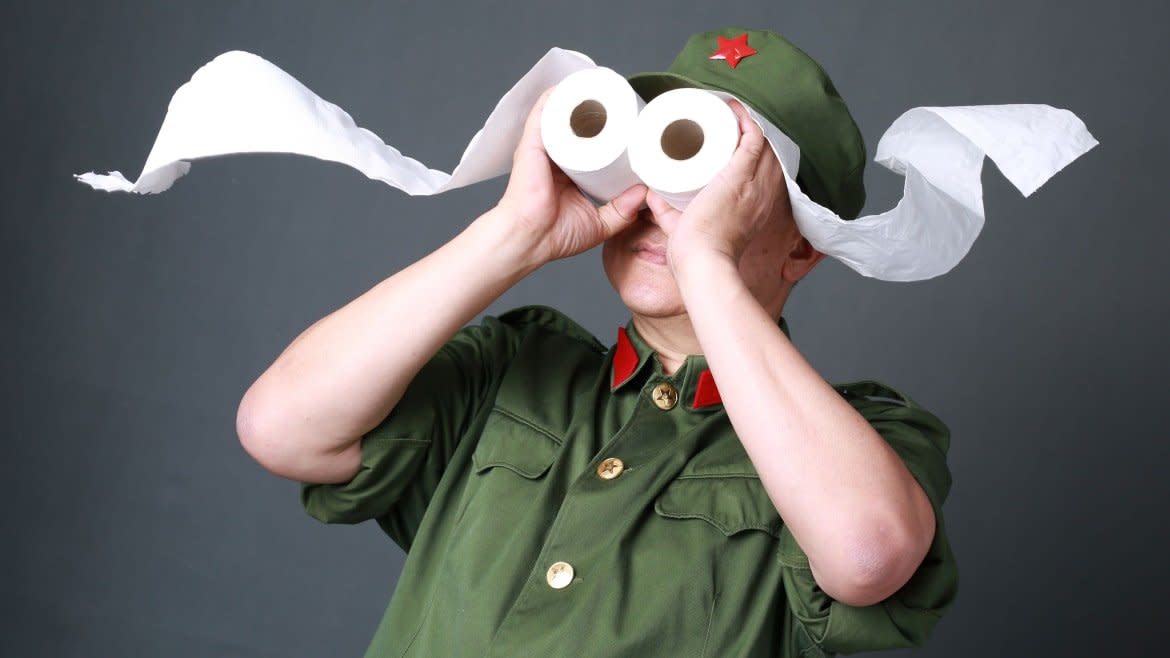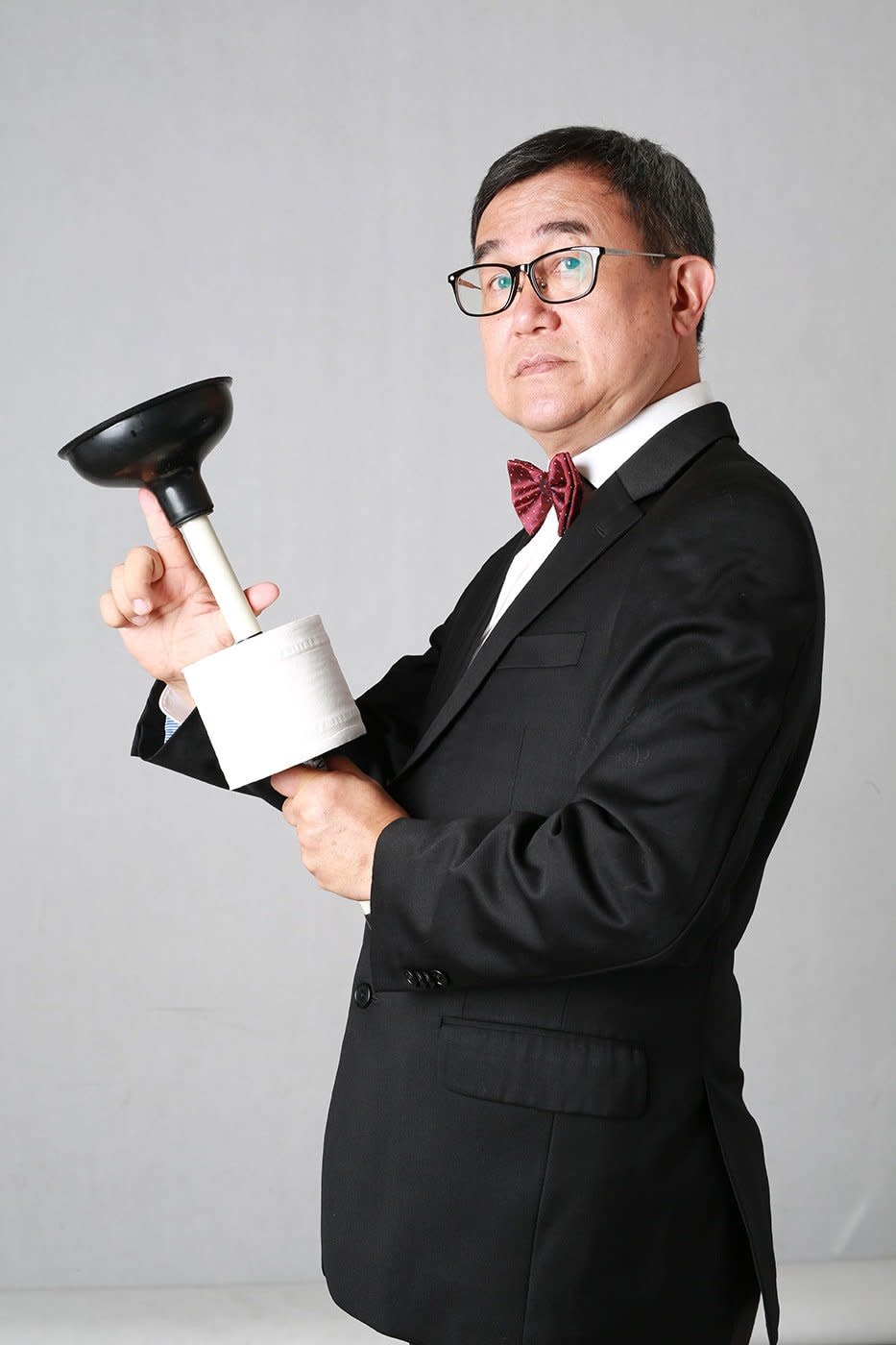Meet Jack Sim, aka Mr. Toilet, the Man Changing the World One Poop Joke at a Time

Jack Sim has a penchant for potty humor.
The 60-year-old Singapore native, best known by the moniker Mr. Toilet, has devoted the past 20 years of his life to raising awareness about the lack of access to toilets worldwide. As he crusades around the world wearing a plush latrine around his torso to promote his ambitious mission—to bring six million toilets to India—poop puns and big ideas are his weapons of choice.
Sim is the subject of the documentary Mr. Toilet: The World’s #2 Man, which premieres in Los Angeles on Nov. 8 and New York on Nov. 22. The 88-minute film, directed by Lily Zepeda, centers on Sim’s work as the founder of the World Toilet Organization nonprofit. Raised in poverty in Singapore, the activist has personally experienced the misfortune of not having a proper place to relieve himself. He worked as a successful salesman in the construction industry for nearly two decades before growing disillusioned with the pursuit of money and its corrupting effects. It was then that he decided to completely dedicate himself to spreading what he calls “the gospel of toilets.”
To make the documentary, Zepeda followed Sim for five years around four countries as he successfully lobbied the United Nations for recognition of U.N. World Toilet Day and spearheaded the “Clean India” initiative to provide the country with six million toilets. She initially planned to have more than one character represent the global sanitation issue, but quickly realized that she had a star in Mr. Toilet. “Within five minutes, we just knew this was the lead character of a film,” Zepeda tells The Daily Beast. “I have to make this gross, disgusting, taboo topic really funny or else people aren’t going to watch it. He was the one.”
One of Sim’s daughters describes him in the film as “like a 12-year-old trapped in a 60-year-old’s body.” Propensity for poop jokes aside, this comparison also feels apt when, during a World Toilet Organization board meeting, he seriously suggests that they stage a classical music concert in Carnegie Hall and invite the Clintons as a fundraiser, or when he pouts about the local government removing his illegal street art. (His four children, for the record, are very good sports and laugh amiably as one reminisces about how in grade school, classmates called her “the toilet daughter.”)
Dirty double entendres roll off Sim’s tongue with impressive ease. “This is a bullshit industry,” he retorts at one point after an unproductive meeting with the government officials on whom he relies for funding. In a clip from a TED Talk played at the beginning of the film, he jokes, “The BBC told me they would interview me about my work, but on one condition. I cannot use the word ‘shit.’ So, I complied, but I felt a little bit constipated.” Sim delivers these zingers completely deadpan, but a mischievous glimmer in his bespectacled eyes nearly always betrays him. When he noticed that “Loo,” as in the British slang word for the toilet, looks like “007” flipped upside down, he staged a James Bond photo shoot, wielding a plunger like a pistol.

“The subject of the toilet is so embarrassing that if you were to speak seriously, especially academically, the news cannot run it because it’s too hard,” Sim tells The Daily Beast. “It’s not palatable. My job is to make the subject humorous so everybody can just laugh at it and the moment they laugh, they are disarmed, and they also find that they have permission to talk about it.”
I worry aloud that Sim’s effectively disarming, but lighthearted approach to raising awareness about a major global health issue might undermine the seriousness of the World Toilet Organization’s mission. Does it ever feel too flip? After all, joking about poop is much funnier when you are not at risk of deadly illness from swimming in contaminated water or even rape from being forced to openly defecate in public (both of which are problems raised in the film). But Mr. Toilet dismisses my concerns about his approach with his trademark optimism.
“People are really intelligent,” he says. “People are really clear about the benefits of toilets. And on the other hand, this is not about me. It is about the mission. So, whatever I do to look like a clown, it really doesn’t matter because what matters is for the mission to get done and for people’s lives to get better, and if they laugh at me as part of the journey, I think that’s worth it.”
So far, Sim’s unorthodox approach to nonprofit work seems to be working. One of the great successes documented in the film was the campaign to get all 193 countries in the United Nations General Assembly to adopt Nov. 19, the day the World Toilet Organization was founded, as the official U.N. World Toilet Day. The move lent some much-needed legitimacy to their effort, and Sim believes it compelled governments to factor sanitation into their budgets and agendas.
In between the victories and the amusing jokes, though, Mr. Toilet manages to capture the urgency of the crisis. The statistics—that 40 percent of the world does not have toilets and that globally, people have the same odds of dying from diarrhea as car accidents—paired with stomach-turning visuals are enough to shock anyone who takes the comfort of a clean bathroom for granted, including this writer. In one particularly illuminating scene, Sim speaks to a group of Chinese school children who try to explain to him why they believe having a cellphone is more important than having access to a sanitary toilet.
Zepeda’s film also illustrates the demoralizing hindrances that plague nonprofit work as Sim encounters challenges like worrying about funds drying up, having to go through slow and restrictive bureaucratic processes, and struggling to get through to the people from other cultures that he is trying to help, who are often resistant to outside intervention.
But Mr. Toilet does not plan to give up the fight anytime soon, and his is ultimately a fight for equality. Because of the stigma clouding the language we use to describe sanitation, it often gets grouped with the political “water agenda.” “They [bureaucrats] cannot say words like ‘toilet’ or ‘poop’ or ‘sanitation,’” Sim says. “They know that when they call it that, they don’t get funding, so they call it the water agenda.” And once the discussion turns to water, issues of waste and hygiene fall to the wayside.
Or, as Zepeda bluntly puts it, “Water is very sexy, it’s glamorous. Shit is not glamorous.” Sim has lofty aspirations when it comes to refocusing the conversation about clean water to the unglamorous source of the pollution. “World Toilet Day is still not celebrated as much as World Water Day,” he laments, “and I hope eventually they will be equal.”
With World Toilet Day just around the corner, I asked how Zepeda and Sim plan to celebrate. Sim will be traveling to Brazil for the annual World Toilet Summit, taking place this year in Sao Paulo. And though Zepeda will be busy preparing for the New York theatrical release of the film, she suggests that she might write a poem about her toilet.
Without skipping a beat, Sim jokes, “An ode to the commode.”
Got a tip? Send it to The Daily Beast here
Get our top stories in your inbox every day. Sign up now!
Daily Beast Membership: Beast Inside goes deeper on the stories that matter to you. Learn more.

